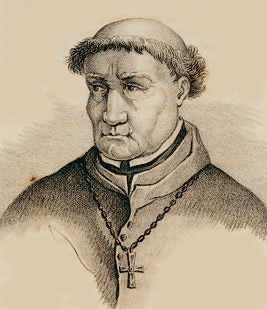Tomás de Torquemada
 |
This article's content is marked as Mature The page Tomás de Torquemada contains mature content that may include coarse language, sexual references, and/or graphic violent images which may be disturbing to some. Mature pages are recommended for those who are 18 years of age and older. If you are 18 years or older or are comfortable with graphic material, you are free to view this page. Otherwise, you should close this page and view another page. |

|
| “ | In 1482, in a monastery in central Spain, a Catholic monk was appointed to the Spanish Inquisition. From this day, Friar Tomas de Torquemada would begin a career renowned for its cruelty and persecution. As head of the Spanish Inquisition, Torquemada was responsible for the deaths of thousands of innocent Spaniards. Known as the 'Black Legend,' he spread fear throughout Spain. Thousands were arrested, interrogated, and mercilessly tortured. Many more were burnt alive at the stake. In the name of his religion, Torquemada forced almost every Jew out of Spain, destroying their lives forever. | „ |
| ~ Introduction to a Discovery Channel documentary about Torquemada |
Tomás de Torquemada, O.P. (1420 – September 16th, 1498) was a 15th-century Spanish Dominican friar and the first Grand Inquisitor in Spain's movement to restore Catholic Christianity among its populace in the late 15th century. As well as being the Grand Inquisitor, Torquemada was also the confessor to Isabella I of Castile. He is notorious for his zealous campaign against the crypto-Jews and crypto-Muslims of Spain. He was one of the chief supporters of the Alhambra Decree, which expelled the Jews from Spain in 1492. About 2,000 people were burned at the stake by the Spanish Inquisition between 1480 and 1530. In modern times, his name has become synonymous with the Christian Inquisition's horror, religious bigotry, and cruel fanaticism.
Biography edit
The nephew of a noted Dominican cardinal and theologian, Juan de Torquemada, the young Torquemada joined the Dominicans and in 1452 became prior of the monastery of Santa Cruz at Segovia, an office that he held for 22 years. He was closely associated with the religious policy of King Ferdinand II and Queen Isabella I, to whom he was both confessor and adviser (to Isabella, from her childhood). He was convinced that the existence of the Marranos (Jewish converts), Moriscos (Islamic converts), Jews, and Moors was a threat to the religious and social life of Spain, and his influence with the Catholic monarchs enabled him to affect their policies. In August 1483 he was appointed grand inquisitor for Castile and León, and on October 17 his powers were extended to Aragon, Catalonia, Valencia, and Majorca.
In his capacity as grand inquisitor, Torquemada reorganized the Spanish Inquisition, which had been set up in Castile in 1478, establishing tribunals at Sevilla (Seville), Jaén, Córdoba, Ciudad Real, and, later, Zaragoza. In 1484 he promulgated 28 articles for the guidance of inquisitors, whose competence was extended to include not only crimes of heresy and apostasy but also sorcery, sodomy, polygamy, blasphemy, usury, and other offenses; torture was authorized in order to obtain evidence. These articles were supplemented by others promulgated between 1484 and 1498. The number of burnings at the stake during Torquemada's tenure has been estimated at about 2,000.
Torquemada's implacable hostility to the Jews probably exercised an influence on the decision of Ferdinand and Isabella to expel from their dominions all Jews who had not embraced Christianity. Under the edict of March 31, 1492, more than 40,000 Jews left Spain.
In his private life Torquemada seems to have been pious and austere, but his official career as inquisitor was marked by a harsh intransigence, which nevertheless was generally supported by public opinion, at least in the early years. Within his own order he was influential as visitator of the reformed Dominican priories of Aragon (1481–88), and his interest in the arts is evidenced in the monastery of St. Thomas at Ávila, where he died. In his final years, Torquemada's health and age, coupled with widespread complaints, caused Pope Alexander VI to appoint four assistant inquisitors in June 1494 to restrain him.
